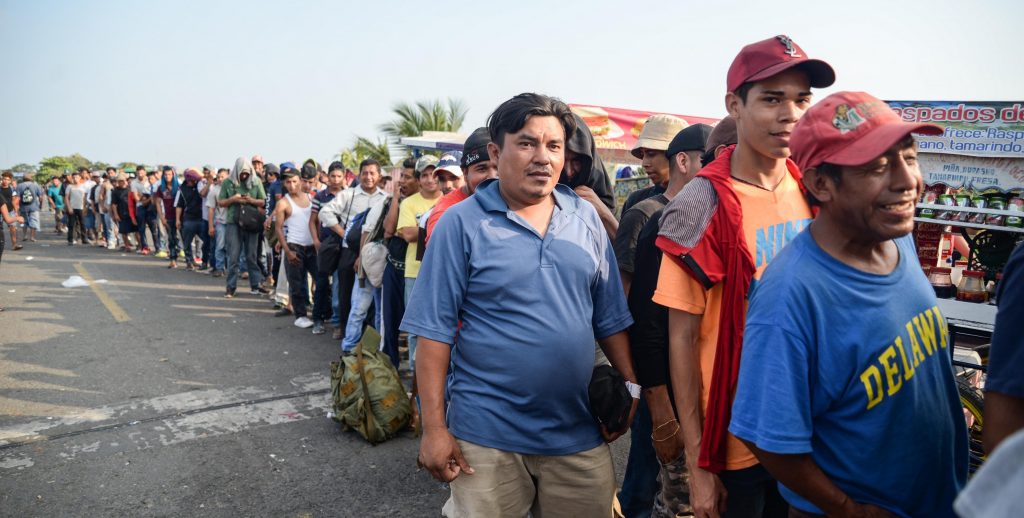“El Salvador es el único país en el Triángulo Norte (Honduras, Guatemala y El Salvador) que ha visto una reducción en la inmigración ilegal este año, casi el 50% menos que el 2017”, subsecretario de Estado para Asuntos Consulares de Estados Unidos, Carl Risch
El subsecretario de Estado para Asuntos Consulares de Estados Unidos, Carl Risch, llegó el martes a El Salvador como parte de una gira que incluye Honduras y Guatemala, a fin de conocer los esfuerzos que se hacen para disuadir y reducir la inmigración irregular en la región.
“El Salvador es el único país en el Triángulo Norte (Honduras, Guatemala y El Salvador) que ha visto una reducción en la inmigración ilegal este año, casi el 50% menos que el 2017”, dijo el funcionario estadounidense en conferencia de prensa junto a la embajadora de ese país, Jean E. Manes.
Risch señaló que “la cantidad de arrestos y detenciones de niños no acompañados, también ha disminuido significativamente”, lo que calificó como buenas noticias, pero afirmó que “aún hay mucho trabajo por hacer”.
Durante su visita a los países del Triángulo Norte se reunirá con funcionarios de los respectivos gobiernos para discutir una variedad de temas consulares y verificará las operaciones consulares en las embajadas de las tres naciones.
Risch destacó que la reducción de la inmigración irregular desde El Salvador ha sido gracias al trabajo conjunto que su país realiza con el gobierno salvadoreño.

Estados Unidos ha comprometido más de dos mil millones de dólares en ayuda para Centroamérica en el año fiscal y Risch dijo que trabajan con los gobiernos, sector privado, organizaciones internacionales y sociedad civil para encontrar soluciones estables para los desafíos de la región.
El diplomático aprovechó para reiterar que la inmigración legal, tramitando una visa, es el único camino seguro y legal para entrar a los Estados Unidos.
“No recomendamos que se viaje a Estados Unidos con coyotes u otros traficantes ilegales, si alguien les dice que pude hacerlos llegar a Estados Unidos sin pasar asuntos legales, no les crean, es posible que a ustedes se les procese y regresen a El Salvador”, agregó.
Por su parte, la embajadora Manes destacó que contrario a Guatemala y Honduras, “los números en El Salvador de la inmigración irregular se ha reducido en una cifra impresionante”.
Sin embargo, reconoció que los avances son frágiles y “hay muchos retos en el tema de la economía, de crear buen empleo y seguimos invirtiendo en mejorar el clima de inversión para traer más empleo”.
Según estadísticas de la Dirección General de Migración y Extranjería de El Salvador, hasta el 23 de julio 13.840 salvadoreños fueron repatriados desde México y Estados Unidos, mientras que en el 2017 fueron 16.333. Del total de repatriados, 8.226 llegaron desde Estados Unidos y 5.475 desde México. Estados Unidos deportó a 51 niños, mientras que en el 2017 la cifra alcanzó 152 infantes.
Arrestos de migrantes batieron un récord en abril en la frontera con México
Con las detenciones de abril, ascienden ya a 460.294 los arrestos de migrantes en el linde fronterizo desde el inicio del presente año fiscal 2019, que comenzó en octubre pasado
Las autoridades arrestaron a 98.977 migrantes indocumentados en la frontera con México en abril, la mayor cifra de los últimos seis meses, según datos publicados este miércoles por la Patrulla Fronteriza (CBP, en inglés).
Con esas detenciones de abril, ascienden ya a 460.294 los arrestos de migrantes en el linde fronterizo desde el inicio del presente año fiscal 2019, que comenzó en octubre pasado.
En su cuenta de Twitter, la CBP subrayó que en lo que llevamos de año fiscal 2019 se ha sobrepasado el número total de arrestos en la frontera desde 2009.
De los arrestados en abril, un total de 8.897 eran menores no acompañados y otros 58.474 miembros de grupos familiares.
La CBP agregó, por otro lado, que un total de 10.167 personas que se presentaron en los puertos de entrada oficiales a su llegada desde México fueron rechazadas por las autoridades frente a las 10.888 del mes de marzo y las 9.651 de febrero pasado.
Durante todo el año fiscal 2018, que se extendió desde octubre de 2017 hasta septiembre de 2018, se denegó la entrada a un total de 124.511 migrantes en los puestos fronterizos de la frontera con México.
El presidente, Donald Trump, declaró el pasado 15 de febrero una emergencia nacional ante la negativa del Congreso de aprobar fondos para su prometido muro en la frontera con México.
Ante una resolución aprobada tanto por el Senado como por la Cámara de Representantes que instaba al mandatario a poner fin a la emergencia, Trump recurrió el pasado 15 de marzo a su potestad de veto.
A principios de mayo, la organización no gubernamental Human Rights Watch (HRW) denunció la creación por parte del Gobierno de centros de detención a base de tiendas de campaña en la frontera de Texas para inmigrantes que cruzan desde México.
La ONG aseguró disponer de imágenes por satélite tomadas el 25 de abril que muestran la “rápida” creación de esos campamentos en puestos gestionados por la Patrulla Fronteriza en El Paso y Donna (ambas en el estado de Texas), que están siendo destinados a albergar a familias y niños migrantes.
USA verifies efforts to reduce irregular immigration
«El Salvador is the only country in the Northern Triangle (Honduras, Guatemala and El Salvador) that has seen a reduction in illegal immigration this year, almost 50% less than in 2017,» Assistant Secretary of State for Consular Affairs of the United States , Carl Risch
The Undersecretary of State for Consular Affairs of the United States, Carl Risch, arrived in El Salvador on Tuesday as part of a tour that includes Honduras and Guatemala, in order to learn about the efforts made to dissuade and reduce irregular immigration in the region. .
«El Salvador is the only country in the Northern Triangle (Honduras, Guatemala and El Salvador) that has seen a reduction in illegal immigration this year, almost 50% less than in 2017,» the US official said at a press conference together. to the ambassador of that country, Jean E. Manes.
Risch said that «the number of arrests and detentions of unaccompanied children has also decreased significantly», which he described as good news, but affirmed that «there is still a lot of work to be done».
During his visit to the countries of the Northern Triangle he will meet with officials of the respective governments to discuss a variety of consular issues and verify consular operations in the embassies of the three nations.
Risch highlighted that the reduction of irregular immigration from El Salvador has been thanks to the joint work that his country is doing with the Salvadoran government.
The United States has pledged more than two billion dollars in aid for Central America in the fiscal year and Risch said it works with governments, the private sector, international organizations and civil society to find stable solutions to the region’s challenges.
The diplomat took the opportunity to reiterate that legal immigration, processing a visa, is the only safe and legal way to enter the United States.
«We do not recommend that you travel to the United States with coyotes or other illegal traffickers, if someone tells you that I could get them to the United States without legal issues, do not believe them, it is possible that you will be prosecuted and return to El Salvador» , he added.
For her part, Ambassador Manes stressed that contrary to Guatemala and Honduras, «the numbers in El Salvador of irregular immigration have been reduced by an impressive figure».
However, he acknowledged that the advances are fragile and «there are many challenges on the subject of the economy, of creating good employment and we continue investing in improving the investment climate to bring more employment».
According to statistics from the General Directorate of Immigration and Immigration of El Salvador, until July 23, 13,840 Salvadorans were repatriated from Mexico and the United States, while in 2017 they were 16,333. Out of the total of repatriates, 8,226 arrived from the United States and 5,475 arrived from Mexico. The United States deported 51 children, while in 2017 the figure reached 152 infants.
Arrests of migrants broke a record in April on the border with Mexico
With the arrests in April, there have already been 460,294 arrests of migrants on the border since the beginning of this fiscal year 2019, which began last October.
Authorities arrested 98,977 undocumented migrants on the border with Mexico in April, the most in the last six months, according to data released Wednesday by the Border Patrol (CBP).
With these arrests in April, there have already been 460,294 arrests of migrants on the border since the beginning of this fiscal year 2019, which began last October.
In its Twitter account, CBP stressed that as of this fiscal year 2019, the total number of arrests at the border since 2009 has been exceeded.
Of those arrested in April, a total of 8,897 were unaccompanied minors and another 58,474 members of family groups.
The CBP added, on the other hand, that a total of 10,167 people who showed up at the official ports of entry upon arrival from Mexico were rejected by the authorities, compared to 10,888 in March and 9,651 in February.
Throughout fiscal year 2018, which lasted from October 2017 to September 2018, a total of 124,511 migrants were denied entry to border posts along the Mexican border.
The president, Donald Trump, declared on February 15 a national emergency before the refusal of Congress to approve funds for his promised wall on the border with Mexico.
Before a resolution passed by both the Senate and the House of Representatives that urged the president to end the emergency, Trump appealed on March 15 to his veto power.
In early May, the non-governmental organization Human Rights Watch (HRW) denounced the creation by the Government of detention centers based on tents on the Texas border for immigrants crossing from Mexico.
The NGO claimed to have satellite images taken on April 25 that show the «rapid» creation of these camps in positions managed by the Border Patrol in El Paso and Donna (both in the state of Texas), which are being designed to house to families and migrant children.

